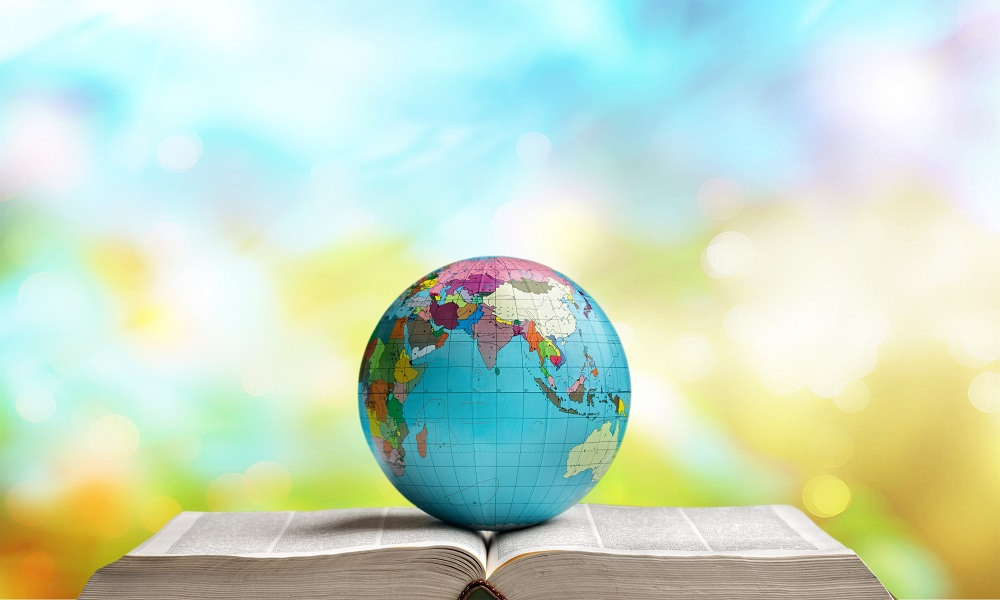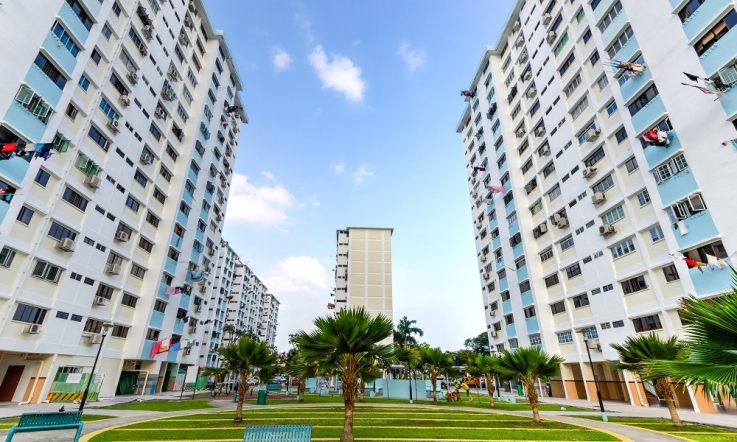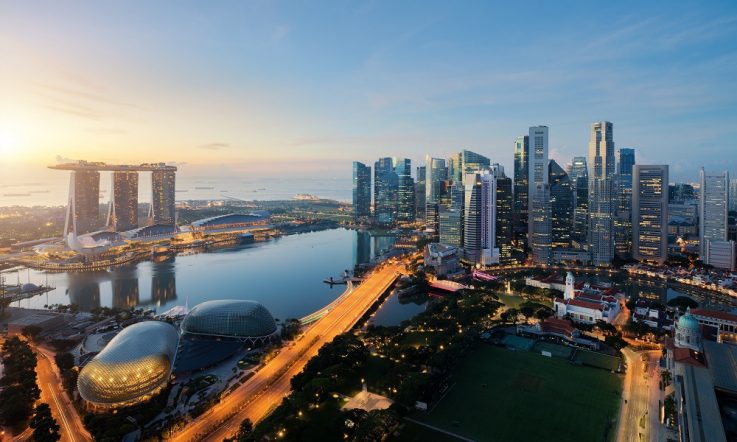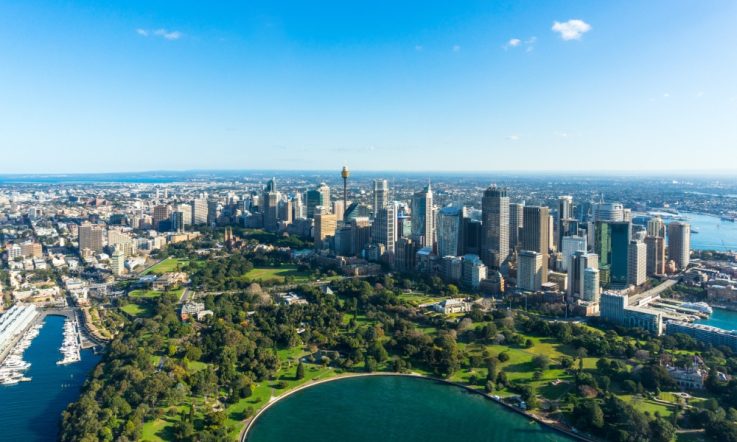Last week, Geography educator Susan Caldis discussed some of the highlights of her two-week professional learning opportunity in Singapore, where she took part in the 2019 Outstanding Educator In Residence (OEIR) program. In today's Q&A she discusses some of the things she learned throughout her time abroad, how she plans on sharing this information with the wider Geography community, and why she'd recommend this immersive experience to other educators.
Before you embarked on this experience, you outlined several goals that you were hoping to achieve. Did you achieve these goals and if so, in what way?
The short answer is yes. I definitely saw progression in my understanding and ability to demonstrate intercultural understanding and a more Asia-capable skillset over the duration of the program. I did learn a lot about the Singapore education system both in facts and figures, its enactment, and its values. This learning came from in-country immersion and the experience of engaging with local teachers, students and leaders in an authentic, sustained way.
I started to track my learning from September 2018 when confirmation of my participation in the OEIR Program occurred. To track my learning I paraphrased and attempted to answer a familiar assessment, programming and reporting question:
What should I know, understand, and be able to do by the end of the OEIR program?
I attempted to find some possible answers to this question. As a starting point, I looked for information about life in Singapore and its education system. I read newspapers, had conversations with university colleagues who had completed similar exchanges, and sent emails to colleagues at the Academy of Singaporean Teachers. I also completed readings from the Asialink-University of Melbourne Intercultural Understanding and Leadership course and the Singapore Country-Starter Pack. In October 2018, I had the opportunity to meet Academy colleagues face-to-face and participate in a short study tour. By the time I departed for the OEIR Program my ‘best guess' or hypothesised answer to the overarching question had formed but was still fairly limited:
By the end of the OEIR program I would know more about the education system of Singapore and also about intercultural communication; I would understand how the program contributes to the professional learning of local teachers; I would be able to do such things as communicate in a culturally appropriate way, start to develop networks, and share learning with Australian colleagues upon my return.
My journey in to the OEIR Program started with a straight forward hypothesis. However, by the time I reached the end of the OEIR Program the above hypothesis seemed simplistic and unambitious. There are layers of complexity within each knowing, understanding and doing.
By the end of the school-visits:
- I knew schools were located in zones and each school had a ‘niche' area or point of difference. I also discovered that primary schools close to the secondary school were not necessarily the feeder schools such as they are in Australia;
- I understood through my active participation in the lessons, conversations with students, and observation of teacher practice that the content knowledge of Geography teachers was well developed, and positive classroom culture is essential for encouraging and drawing out student-voice within a lesson;
- I could do such things as recognise cultural ways of being in the classroom that (to me) were distinctive to Singapore.
By the end of the masterclasses:
- I knew teachers were intrigued by the idea of bite-sized fieldwork and that teachers valued professional learning opportunities;
- I understood through my face-to-face conversations with masterclass participants and through responding to comments on Padlet that the reality of implementing co-constructed inquiry questions and bite-sized fieldwork in to one Geography lesson was challenging because it was ‘messy' and teacher readiness or confidence may need work;
- I could do such things as facilitate sessions and respond to sharing in a more culturally appropriate way.
By the end of the dialogues:
- I knew a ‘teacher' took many forms in Singapore, it was not only defined by their placement in schools;
- I understood that synergies existed between all dialogue groups in the desire to learn more about evidence based pedagogical practice in Geography, and possible ways to support and extend ideas about the implementation of pedagogical practice in a Geography classroom;
- I could do such things as apply experiences from Australia to the Singapore context so that more considered and informed responses could be shared from me in response to questions being posed.
By the end of the lunches, classroom lessons and cultural program:
- I knew and more importantly understood about why and how Singapore is acknowledged as a world leader in racial harmony amongst much diversity, and why education is so highly valued. Singapore is located at the juncture between east and west – culturally and physically. It is a hub of interconnections between people, place and change. It is also a requirement of the nation to not become complacent and to be mindfully and continually future-facing. As a result, the population of Singapore, regardless of culturalor economic background are celebrated as a natural resource. Education is highly valued. All are supported and privileged with the opportunity to develop their skills and capabilities to help move themselves, their families, and the country forward in sustainable progressive way. This is achieved through education and the mindset of becoming lifelong learners regardless of profession;
- I could do such things as articulate the above clearly to people whose lived experience was this situation, and to people for whom my newly acquired understanding was a revelation.
Overall, my key learning is that the OEIR Program would not be possible without Relationships, Reciprocity and Sharing as shown in Diagram 1 below:
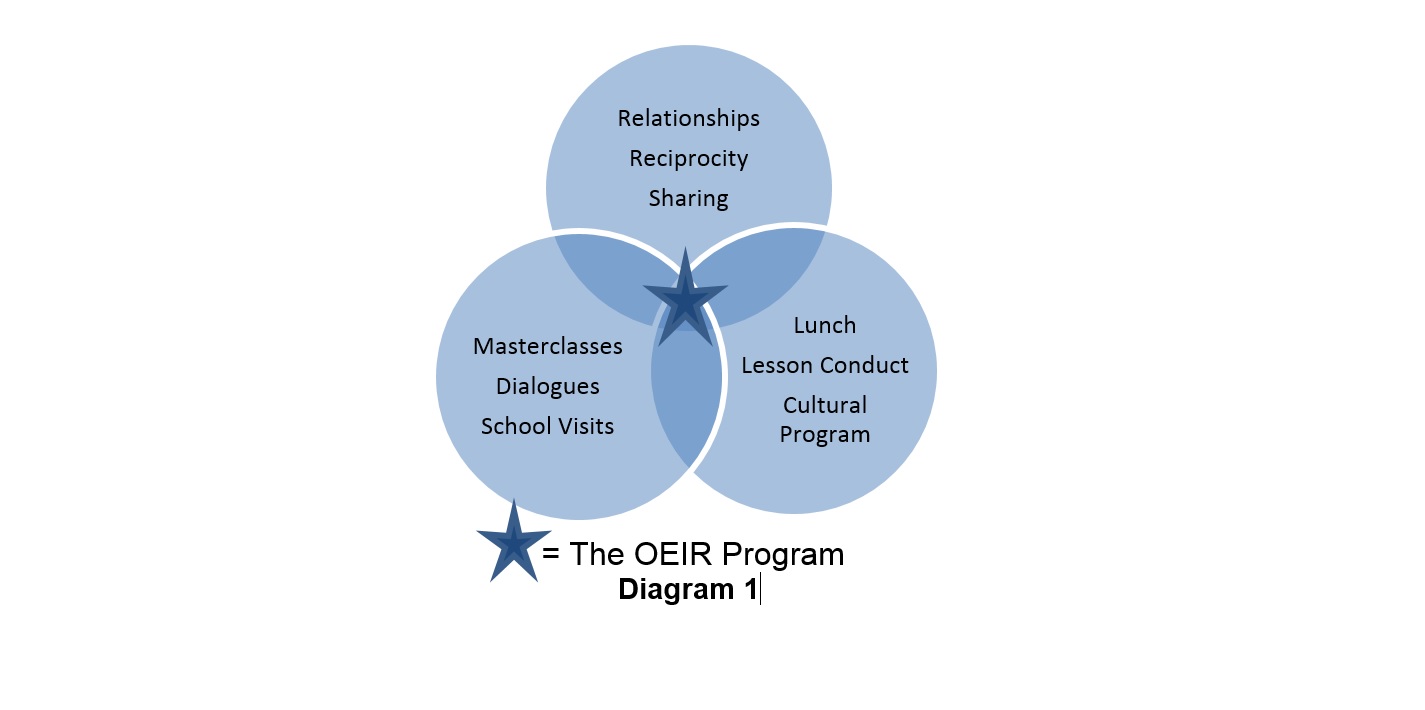
How will you share what you learned with the wider Geography community here in Australia?
Whilst in Singapore, I posted most days on Facebook and Twitter about my cultural experiences and the nature of educational events completed. The intention was for these posts to provide not only a snapshot of information about the OEIR Program to friends, family and colleagues who were interested in what I was doing but also a starting point for further discussion once I returned to Australia.
There are plans to share learning from the OEIR Program in collaboration with colleagues from Singapore, for example this may take the form of co-authored journal articles or joint-presentations at conferences. To share the learning in a shared capacity is important as the learning was reciprocal and relationships have been developed.
From a personal position, learnings can be shared with the wider Geography community through journal articles, conference presentations, workshops with pre-service teachers and future social media posts. I'm also hoping to continue to share my learning through one-to-one dialogue or small group discussion face to face with pre-service teachers and colleagues from both Singapore and Australia.
It is encouraging to know current colleagues at university have already invited me to share my intercultural learning experience with them as part of their preparation for departure to lead professional learning in the Asia region. In being able to share learning in collaborative, personal, formal, and informal ways, between the academic Geography community and the school-based Geography teaching community, I'm hoping that the profile of Geography and Geography education in Australia will become more prominent and talked about at personal, local, national and international scales. Geography education in Australia has a lot to offer students and educators both here and overseas, particularly in terms of our willingness to adopt and move forward with signature pedagogical approaches.
Is this experience something that you'd recommend to other educators? Why?
Any opportunity to learn through immersion about an education system or context that is different to the one currently being worked in is definitely an experience worth embracing as an educator. The immersive experience can take many forms and doesn't need to be international. The regional, remote and urban context of teaching, learning and assessment within Australia also provides rich learning opportunities.
The study-tours I've been fortunate to complete in previous years with the Asia Education Foundation to China, South Korea and Singapore, and also now, in the OEIR Program with the Ministry of Education and Academy of Singaporean Teachers have enabled me to learn deeply about new contexts and has influenced my practice to become more culturally sensitive and appropriate when interacting with students and colleagues from the Asia region.
My appreciation about the diversity of education systems has been enhanced through participation in educational experiences that take place out of my known and familiar context. I absolutely recommend immersive education experiences such as the OEIR Program, school-focused study tours and similar if you are looking for an enriching learning experience to learn-through-doing or to learn-through-engagement about schooling and education in other places, and more importantly if you are prepared to be challenged along the way.
Susan Caldis says any opportunity to learn through immersion about an education system or context that is different to the one currently being worked in is definitely an experience worth embracing.
Have you had the opportunities to learn from colleagues working in another context? What did you learn from this experience?
How did you share these learnings with your colleagues in education?
